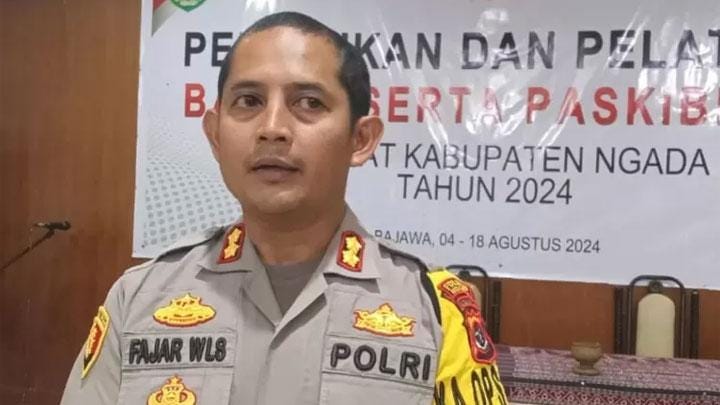A tip-off from Down Under led to the downfall of child predator police chief as Indonesia's record of police violence grows
It took two months for the police to name Fajar a suspect for alleged sexual abuses of three children and a woman. His name is now in the long list of police violence cases.

The Indonesian Police has finally named Fajar Widyadharma Lukman Sumaatmaja, the former police chief of Ngada in East Nusa Tenggara, as a suspect in the sexual abuses of three children and a woman.
Dressed in criminal orange, his mouth covered with a black face mask, Fajar was presented at a much-awaited press conference last Thursday in Jakarta following a public outcry over the lengthy two-month investigation, which was intervened by his questionable transfer to the national headquarters’ service department.
Polri spokesperson, Brig. Gen. Trunoyudo Wisnu Andiko said Fajar had allegedly assaulted three children – aged six, 13, and 16 – and a 20-year-old woman. It is understood that he recorded the abuses, with investigators seizing a CD containing eight videos believed to have been uploaded to an overseas pornography site.
Whether Fajar sought financial gains from the videos remains unclear. “The [investigation] process is still ongoing,” Trunoyudo stated.
He said Fajar was facing both ethics and criminal proceedings simultaneously, having allegedly violated the national police’s code of ethics in addition to committing multiple counts of sexual assault, which may lead to his dismissal from Polri and 12 years behind bars.

Fajar is also accused of violating Article 45 of the 2024 Electronic Information and Transactions Law, which carries a maximum sentence of six years in prison.
In addition, Polri’s chief of Internal Affairs Division, Brig. Gen. Agus Wijayanto said the suspect tested positive for amphetamine and methamphetamine use.
He said Fajar had been in custody since February 24. The ethics hearing against him begins on March 17.
“Polri is impartial in enforcing the law and does not tolerate any offence against this institution’s honor and values,” Agus claimed.
Tip-off from Down Under
Fajar’s arrest started with a tip-off from the Australian Federal Police (AFP) in January after the Australian Centre to Counter Child Exploitation notified Polri of child abuse materials circulating on the “dark web”, as reported by ABC.
An AFP spokesperson was quoted as saying that the finding also led to the arrest of a man last month. According to a press statement on AFP’s website, a 52-year-old WA man had been arrested in early February for “allegedly accessing a dark web child exploitation site”.
The man faces a maximum sentence of 15 years’ imprisonment – three years longer than the maximum sentence Fajar may receive for his sexual violence.

East Nusa Tenggara Police’s director of general crime investigation, Chief Commissioner Patar Silalahi, said Fajar’s crimes went as far back as 11 June 2024 when he rented a room at a three-star seaside hotel in Kupang, the province’s capital, using his own driver’s license.
According to Kompas.id, Fajar contacted a woman identified as F and instructed her to bring him a child in exchange for Rp 3 million (A$300). F then arrived with a six-year-old child, identified by police as Child Victim 1.
Patar said the police had questioned nine witnesses and collected evidence, including the hotel’s guest book, the victim’s pink dress, forensic medical reports, and the CD containing the sexual abuse videos.

Support for victims
As Fajar awaits trial, Suryani from the Social Affairs Ministry’s child rehabilitation directorate said social workers had provided material and psychological assistance to the victims and would stay with them throughout the upcoming legal proceedings.
However, the Women’s Empowerment and Child Protection Ministry’s deputy of child protection, Nahar, said there were other children who fell victim to Fajar’s crimes but refused to come forward out of their parents’ shame.
“We are doing our best to ensure that these children receive equal amount of attention,” he said. “It is our collective duty to protect our children.”
A repetition
When whisked away by uniformed officers halfway through the one-hour press briefing, Fajar told journalists tailing him in an attempt to get a comment, “I love Indonesia.”
But his words highlight the discrepancy of what Polri claims to stand for and its actual actions. Far from loving his country, Fajar has joined the long list of police crimes and acts of violence against civilians recorded since late last year:
November 2024: Gamma Rizkynata Oktafandy, a 17-year-old from Semarang, Central Java, was shot dead by a police sub-inspector, Robig Zaenuddin, for allegedly attacking him during a gang fight. However, CCTV footage showed no sign of an attack or gang fight. The Semarang police even held a press conference, laying accusation to the deceased teenager and presenting bladed weapons that the public suspected were fabricated evidence.
January 2025: At least 20 police faced ethics proceedings for extorting Malaysian nationals at the Djakarta Warehouse Project electronic music festivals. Their punishments varied from dismissal to demotions lasting five to eight years.
February 2025: Sukatani, a punk duo from Purbalingga, Central Java, were forced to appear in a video without masks – an integral part of their stage act – and reveal their identities to apologise to Polri for their song, Bayar Bayar Bayar (Pay, Pay, Pay) after months of intimidation. The song is a critique of the police’s deep-rooted culture of corruption. Following a massive online backlash, Polri Chief Gen. Listyo Sigit later stated that the institution was open to criticisms. He went so far as to invite the duo to be Polri’s ambassadors – an offer the band declined.
March 2025: Pandu Brata Syahputra Siregar, an 18-year-old orphan from Asahan, North Sumatera, died after a police officer allegedly kicked him in the head during a midnight raid of an unsanctioned street running race. The local police have denied the allegations against them and later exhumed Pandu’s body for an autopsy.
March 2025: Kusyanto, 38, a man from Central Javanese regency of Grobogan, was wrongfully arrested by a sub-inspector at the local police and forced to admit stealing a water pump before being made to sign a letter of “harmonious dispute settlement”. A policeman was later placed under internal investigation after a video of him reprimanding and beating Kusyanto went viral.
March 2025: Police Adjunct Commissioner Aswar, the chief of narcotics unit at South Sulawesi’s Bone Police, has been demoted for extortion. It was found that he demanded Rp 80 million (A$8,000) in “peace money” from the family of a suspect. Around the same time, two police offcers in Riau Islands provincial police have been discharged for a similar offence, forcing a suspect in a narcotics case to get Rp 20 million (A$2,000) from a digital peer-to-peer lending app. Seven other officers were demoted.
March 2025: A brigadier at Central Java’s police identified as AK has been reported to his own force by his wife after allegedly killing their two-month-old baby. AK has been taken into custody in Semarang and is facing ethics and criminal proceedings.
Usman Hamid, Amnesty International Indonesia’s executive director, said this endless list of cases stemmed from “a regime of impunity” that ran deep in Polri. The institution requires “serious evaluations” by different national stakeholders, especially the president and parliament.
“This regime of impunity has become part of Polri’s culture as it appears to be permissive of repeated human rights violation perpetrated by its members,” he said.





